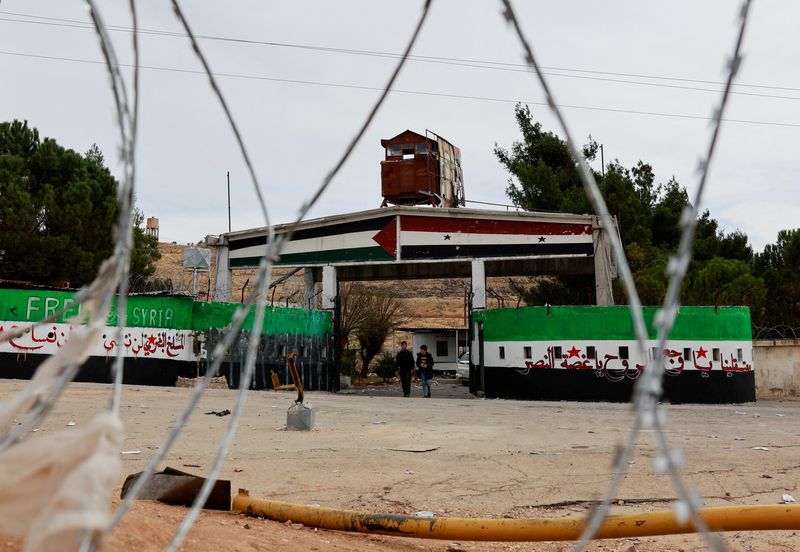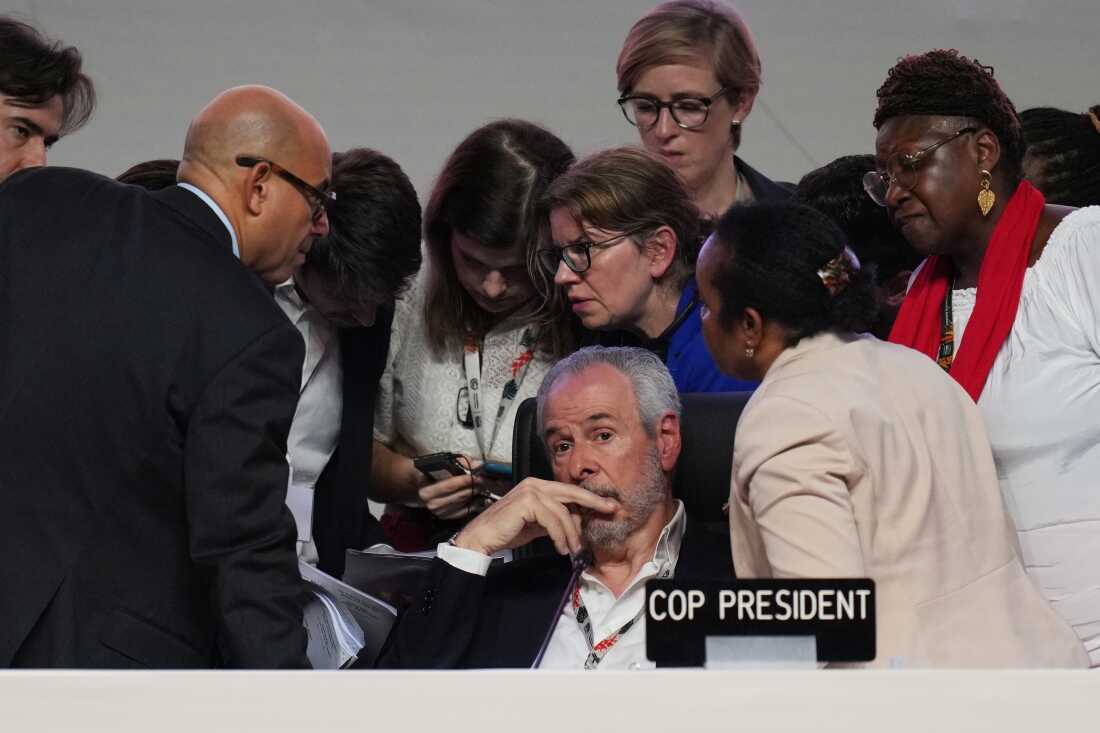By Timour Azhari, Maya Gebeily and Tom Perry
DAMASCUS/BEIRUT (Reuters) – Insurgent chief Ahmad al-Sharaa’s Islamist group is stamping its authority on Syria’s state with the identical lightning velocity that it seized the nation, deploying police, putting in an interim authorities and assembly overseas envoys – elevating issues over how inclusive Damascus’ new rulers intend to be.
Since Sharaa’s Hayat Tahrir al-Sham (HTS) group swept Bashar al-Assad from energy on Sunday on the head of a insurgent alliance, its bureaucrats – who till final week have been operating an Islamist administration in a distant nook of Syria’s northwest – have moved into authorities headquarters in Damascus.
The appointment of Mohammed al-Bashir, the pinnacle of the regional authorities in HTS’ enclave of Idlib, as Syria’s new interim prime minister on Monday underlined the group’s standing as probably the most highly effective of the armed teams that battled for greater than 13 years to finish Assad’s iron-fisted rule.
Though it was a part of al Qaeda earlier than breaking ties in 2016, HTS had reassured tribal leaders, native officers, and peculiar Syrians throughout its march to Damascus that it might defend minority faiths, successful broad approval. The message helped easy the rebels advance and Sharaa – higher generally known as Abu Mohammed al-Golani – has repeated it since Assad’s ouster.
On the workplace of the Damascus governor, its partitions exquisitely embellished with marquetry and stained glass, the person introduced from Idlib to run affairs dismissed issues that Syria was being moved in the direction of an Islamic type of authorities.
“There is no such thing as Islamic governance. After all, we are Muslims and it’s civil institutions or ministries,” mentioned Mohammed Ghazal, a bespectacled 36-year-old civil engineer with a thick beard who was raised within the United Arab Emirates and spoke in close to excellent English.
“We don’t have any problem with any ethnicity and religion,” he mentioned. “The one who made the problem was the (Assad) regime.”
Nevertheless, the way in which HTS has gone about shaping the brand new interim authorities – by bringing senior directors from Idlib – has prompted concern for some. 4 opposition sources and three diplomats instructed Reuters they have been involved in regards to the inclusiveness of the method up to now.
Bashir has mentioned he’ll solely stay in energy till March. However HTS – which stays labeled as a terrorist group by america, regional powerbroker Turkey and different governments – has but to spell out key particulars of the transition course of, together with its pondering on a brand new structure.
“You are bringing (ministers) from one colour, there should be participation of others,” mentioned Zakaria Malahifji, secretary common of the Syrian Nationwide Motion who as soon as served as political advisor to rebels in Aleppo. He mentioned the shortage of session in forming an interim authorities was a misstep.
“Syrian society is diverse in terms of cultures, ethnicities, so frankly this is concerning,” he mentioned.
‘RUINS, RUINS, RUINS’
Like different members of the HTS-affiliated Salvation Authorities in Idlib delivered to Damascus to run state our bodies, Ghazal mentioned he had given assurances to workers and urged them to return to work. “It’s a collapsed state. It’s ruins, ruins, ruins,” Ghazal mentioned.
His priorities for the subsequent three months are getting primary companies operating and streamlining the paperwork. Salaries, which common some $25 a month, can be elevated in step with Salvation Authorities wages. Its minimal wage is $100 a month.
“Syria is a very rich country,” mentioned Ghazal, requested how this could be financed. “The regime used to steal the money.”
Policemen introduced from Idlib are directing visitors in Damascus, making an attempt to revive some normalcy since HTS ordered armed teams out of the town. One officer, who didn’t give his identify, mentioned they have been stretched skinny, noting they beforehand simply needed to patrol Idlib.
Although HTS is preeminent among the many factions which fought Assad, others stay armed, notably in areas on the borders with Jordan and Turkey.
Through the conflict, insurgent factions usually clashed with every, leaving a legacy of rivalries and enmity seen as one among many dangers to stability in post-Assad Syria.
Yezid Sayigh, a senior fellow on the Carnegie Center East Heart, mentioned HTS “clearly is seeking to maintain the momentum on all levels”, including that any group of their place, taking on from a collapsed regime in an exhausted nation, would behave broadly the identical manner.
“There are multiple risks with HTS setting priorities and the pace for what comes next. One of these is to establish a new form of authoritarian rule, this time in Islamic garb,” he mentioned.
However he assessed the range of Syria’s opposition and society would make it troublesome for one group to monopolize affect.
Turkey – an influential backer of the opposition – was additionally eager for a authorities that might win worldwide backing, he mentioned.
‘WE WILL ONLY STAY UNTIL MARCH’
An opposition supply conversant in HTS consultations mentioned all of Syria’s sects would have illustration in a caretaker authorities. Points to be decided within the subsequent three months included whether or not Syria ought to have a presidential or parliamentary system of presidency, the supply mentioned.
The Syrian revolt spiralled out of the 2011 Arab Spring uprisings that toppled autocrats in Egypt, Tunisia, Libya and Yemen, giving rise to turbulent and infrequently violent intervals of transition.
In an interview with Italian newspaper Il Corriere della Sera revealed on Wednesday, Prime Minister Bashir mentioned “we will only stay until March 2025”.
The priorities, he mentioned, have been restoring safety and state authority, bringing residence thousands and thousands of Syrian refugees, and offering important companies.
Requested whether or not Syria’s new structure can be Islamic, he mentioned “these details” can be clarified within the constitution-making course of.
Mohammed Alaa Ghanem, a number one Syrian activist primarily based in Washington and in contact with senior opposition figures, mentioned HTS was being urged to “be smart and get the transition right, instead of letting the moment go to their heads by completely dominating the new government”.
The Biden administration has urged HTS to not assume automated management of Syria however as an alternative run an inclusive course of to type a transitional authorities, in line with two U.S. officers and a congressional aide briefed on the primary U.S. contacts with the group.
U.S. Secretary of State Antony Blinken has mentioned the transition in Syria ought to result in “credible, inclusive, and non-sectarian governance” in step with U.N. Safety Council Decision 2254.
That decision, permitted in 2015, requires a Syrian-led course of facilitated by the United Nations, establishing inside six months non-sectarian governance and setting a schedule for a means of drafting a brand new structure.
It additionally calls without spending a dime and honest elections.
One diplomat in Damascus mentioned HTS is the one faction assembly with overseas missions. “We are concerned – where are all the heads of the political opposition,” the diplomat mentioned. “It would be a major signal to have them here, and they are not here.”
A second diplomat mentioned HTS had conveyed good messages to the general public however the diploma of inclusiveness displayed in current days was disturbing. Constitutional reform, specifically, have to be an inclusive course of and can be a very massive take a look at.
The diplomat famous the presence of many different factions which have but to disarm or demobilise as a probably destabilising issue if an inclusive course of doesn’t happen.

Joshua Landis, a Syria professional and head of the Heart for Center East Research on the College of Oklahoma, mentioned Sharaa “must assert authority quickly to stop a decent into chaos”.
“But he must also try to scale up his administrative capacity by bringing in technocrats and representatives of the diverse communities,” he mentioned.




